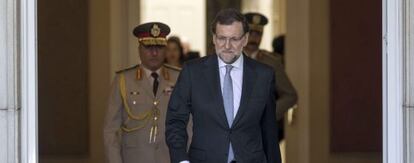Spain ready to support France by taking over Africa operations
A greater Spanish presence would free up French soldiers for action against ISIS in Syria Offer comes day before attackers take 170 hostages in hotel in Malian capital

Prime Minister Mariano Rajoy has said he is willing to help France by taking command of its army’s operations in Africa, particularly in Mali and the Central African Republic.
The Defense Ministry is working on a plan to contribute more Spanish troops in various African countries, with a focus on Mali and the Central African Republic, and on support for those two missions from air bases in Senegal.
Rajoy has not yet received a specific request for such a move from French president François Hollande, nor has he officially informed Spanish opposition leaders about the plan. But on Thursday he admitted that if France should ask, Spain stands ready to accept.
Hostages taken in Mali hotel
Prime Minister Mariano Rajoy’s offer came just one day before attackers stormed a hotel in Bamako, the capital of Mali, taking around 170 people hostage.
The Spanish embassy in Mali said on Friday morning that it was not aware of any Spaniards involved in the hostage-taking at a luxury hotel in the capital, Bamako.
Sources at the Foreign Ministry added that the embassy in Bamako is in touch with local authorities to follow the developing situation inside the Radisson Blu Hotel, where around 10 attackers are keeping approximately 170 people hostage – 140 guests and 30 employees, according to hotel reports.
Through its Twitter account, the Spanish embassy is recommending keeping off the streets of Bamako following the “explosion and shots” heard inside the hotel.
The idea is to increase Spain’s military presence in Africa to relieve French soldiers from their various duties on the continent and free them up for anti-terrorist surveillance and for France’s campaign against the Islamic State (ISIS) in Syria in the wake of last Friday’s terrorist attacks in Paris.
Rajoy would prefer this scenario over other options, such as direct participation in the coalition conducting raids against ISIS, because of its lower political cost and because instability in the Sahel area affects Spain more directly.
Most Spanish parties remain unwilling to commit to direct participation in bombing raids in Syria without a clear international mandate from the United Nations. And with a general election coming up on December 20, the government would rather not make such a momentous decision for the moment.
The French ambassador in Madrid, Yves Saint-Geours, said on Thursday that his government has not yet made any specific request, and thanked Spain for its offer of support in Africa. He added that “in no way will there be any pressure” to get Spain to participate in Syria.
If Rajoy’s proposal takes shape, the handover would probably take place in countries where the Spanish army already has a presence: Mali, where 117 Spanish troops are integrated into a European Union operation, and in the Central African Republic, where 22 Spanish soldiers are participating in a mission called Eumam RCA.
In both cases, the Spanish army provides training and advisory work in order to improve the performance of local armies fighting armed militia groups.
Spain also has two air bases in Dakar (Senegal) and Libreville (Gabon) with carrier aircraft and around 500 troops stationed in each one.
French troops have been fighting jihadism in Mali, where terrorist activities also affect neighboring nations such as Mauritania, Niger, Burkina Faso and Chad.
For Spain, which has an army of 132,000, beefing up its units in Africa will be relatively straightforward. And because those operations have already received congressional approval, raising the contingent should not be difficult.
Following his recent conversations with opposition leaders, whose attitude he described as “reasonable and sensible,” Rajoy does not believe that such an initiative would run into significant domestic trouble.
English version by Susana Urra.
Tu suscripción se está usando en otro dispositivo
¿Quieres añadir otro usuario a tu suscripción?
Si continúas leyendo en este dispositivo, no se podrá leer en el otro.
FlechaTu suscripción se está usando en otro dispositivo y solo puedes acceder a EL PAÍS desde un dispositivo a la vez.
Si quieres compartir tu cuenta, cambia tu suscripción a la modalidad Premium, así podrás añadir otro usuario. Cada uno accederá con su propia cuenta de email, lo que os permitirá personalizar vuestra experiencia en EL PAÍS.
¿Tienes una suscripción de empresa? Accede aquí para contratar más cuentas.
En el caso de no saber quién está usando tu cuenta, te recomendamos cambiar tu contraseña aquí.
Si decides continuar compartiendo tu cuenta, este mensaje se mostrará en tu dispositivo y en el de la otra persona que está usando tu cuenta de forma indefinida, afectando a tu experiencia de lectura. Puedes consultar aquí los términos y condiciones de la suscripción digital.








































